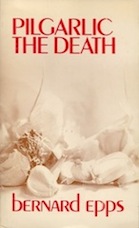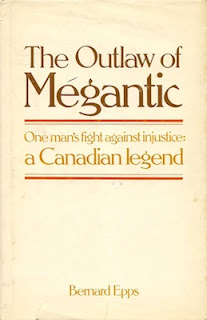The Town Below [Au pied de la pente douce]
Roger Lemelin [trans. Samuel Putnam]
New York: Reynal & Hitchcock, 1948
We open on thieves fleeing the scene of a crime. They scramble, descending on Quebec's Lower Town. Cops wait below, but can't catch them. No surprise there. These crooks are young, spry, and this part of the city, St-Sauveur, is their territory. They take refuge in the Lévesque family's garage; Lise Lévesque provides cover. By way of thanks, she's offered a share of the goods: apples stolen from the Dominican brothers' orchard.
Lise,
belle Lise, has just returned from convent school. Two of the gang, best pals Denis Boucher and Jean Colin, are immediately smitten. I was too, and prepared for a tale of friendship torn apart by the pursuit of the most beautiful girl in St-Sauveur. Instead, I encountered the finest social satire I've read in years. This isn't to say that the rivalry between Denis and Jean doesn't figure, rather that it doesn't dominate. For the better half of the book it is nothing more than another thread in the tangle of relationships, events and interests that clogs this working class neighbourhood.
 |
| The Globe & Mail, 12 April 1948 |
The Town Below is a first novel; as is my habit I made allowances. The chaos of that first scene sets a bad course. Lemelin crams and confuses by trying to accomplish too much all at once. Focus shifts, jarringly, between paragraphs, and there are simply too many characters. But who to cut? All are so fascinating! My personal favourites are Cécile and Peuplière Latruche, spinster sisters who have singled out one of St-Sauveur's dead consumptive kids for sainthood:
Prior to the discovery of their little saint, these parasites, disappointed at being refused admission to the Daughters of Mary and the Ladies of the Holy Family, had felt themselves to be of little importance, without an object in life. In view of this, it is not so hard to understand their sudden and furious devotion to this dead youth, whom they in a manner of speaking had rehabilitated. These elderly spinsters had a purpose now; and if their past was wholly taken up with their virginity, the Ark of the Covenant for them, their future was filled with the disembodied form of a heavenly stripling.
Avant la découverte de leur petit saint, ces parasites, dépitées d'être refusées parmi les Enfants de Marie et les Femmes de la Sainte Famille, s'étaient senties comme diminuées. Aussi ne songeait-on pas à convaincre de futilité ces vieilles filles dont tout le passé était rempli par le conservatisme de leur virginité et dont tout l'avenir se remplirait des formes désincarnées d'un céleste jouvenceau.
I offer the original French because the greatest problem with
The Town Below isn't Lemelin, rather translator Samuel Putnam. An American francophile who, one presumes, knew much more about France than Canada. After misspelling Wilfrid Laurier's name in the Introductory Note, he writes:
The term "restaurant" has here been employed in the Canadian sense, that of a small shop where candies, ice-cream comes, liqueurs, and the like are sold.
I have no idea what he's talking about.
Putnam stinks when it comes to dialogue – "
Les flics, les gars!" becomes "It's the cops, fellows!" – but his greatest weakness is verbosity and explication.
Au pied de la pente douce is 90,000 words long;
The Town Below is 125,000.
If anything, one would expect the reverse.
The beginning of the novel's fifteenth chapter has Denis walking home, books in hand, when he encounters Lise:
— Les beaux livres! Prêtuez-les moi.
Il eut sourire embarrassé.
— Ils sont à l'index.
Ell masqua son désire plus ardent de les lire.
Putnam's translation adds both dialogue and description:
"What have you there?" she asked.
"Some books."
"How nice! Lend them to me, will you?"
His own smile was an embarrassed one. "They are on the Index."
That made her all the more anxious to read them, but she was careful not to let him perceive it.
The exchange serves as a reminder, as if any were needed, that this is a novel written and set in Duplessis-era Quebec. That it was published during that dark time, escaped the censor, sold over 25,000 copies in year one, and received the Prix David and the Prix de la langue française has had me questioning my understanding of the
Grande Noirceur.
 |
| The Gazette, 15 May 1946 |
Putnam's translation, published by McClelland & Stewart (Canada) and Reynolds & Hitchcock (United States), garnered a good amount of attention, but soon slipped out of print. In 1961,
The Town Below was revived as book number 26 in the New Canadian Library. It was reprinted four times in twelve years before being dropped from the series. One wonders why; there were other titles that didn't perform nearly so well.
Should we blame Constance Beresford-Howe, who in reviewing the NCL edition dismissed the novel as one that had a shock value long past?
Nah.
Margaret Laurence, whose opinion Jack McClelland regarded highly, thought
The Town Below "a sprawling and savagely funny novel grotesque and evasive, endlessly interesting."
Lemelin's debut is every one of those things. A bit too sprawling perhaps, but I don't hesitate in recommending. Read it in the original if you can; read it as
The Town Below if you can't. What you'll find is one of the finest first novels to have ever come out of Quebec.
It's so good that even a crummy translation is worth your time.
Bloomer:
There was silence, possibly filled by the stammerings of a limp and deflated Pritontin. He was heartbroken over what had happened in the church and no longer counted on anything less than a miracle. That firecracker had destroyed something more than his trousers.
Trivia: The Reynal & Hitchock edition confuses Lemelin's birthplace, Quebec City's St-Saveur, with the town of the same name three hundred kilometres to the west.
More trivia: Janet Friskney's
New Canadian Library: The Ross-McClelland Years, 1952-1978, informs that Glen Shortliffe, who penned the NCL introduction, alerted M&S to "lapses in idiom and mistaken translations of particular words" found in Putnam's work. These were addressed by an in-house editor before publication.
Still more trivia: Lemelin's original title was
Les grimpeurs.
Object: A 302-page hardcover in grey cloth with burgundy print. The cheap paper stock used by Reynald & Hitchcock makes for a book that is much slimmer than one might expect. My copy once belonged to W.F. Beckwith, who lived at 4194 Melrose Ave., Montreal, two blocks south from where I lived when attending university. It was bought for three dollars in 1988, the year after I graduated.
I can't believe it took so long to get around to reading it.
Access: First published in 1944 by les Éditions de l'Arbre,
Au pied de la pent douce has ever been out of print. Its current publisher is Stanké. Samuel Putnam's translation was reissued two years ago with a new Introduction by Michael Gnarowski as part of Dundurn's Voyageur Classics series.
Two copies of the Reynal & Hitchcock edition are listed online; the better of the two – "Good" – is priced at twenty American dollars. The McClelland & Stewart hardcover is nowhere in sight. New Canadian Library copies can be had for as little as a Yankee buck.
Held by the best of our bigger public libraries and nearly all of our universities.
I have three.
























































